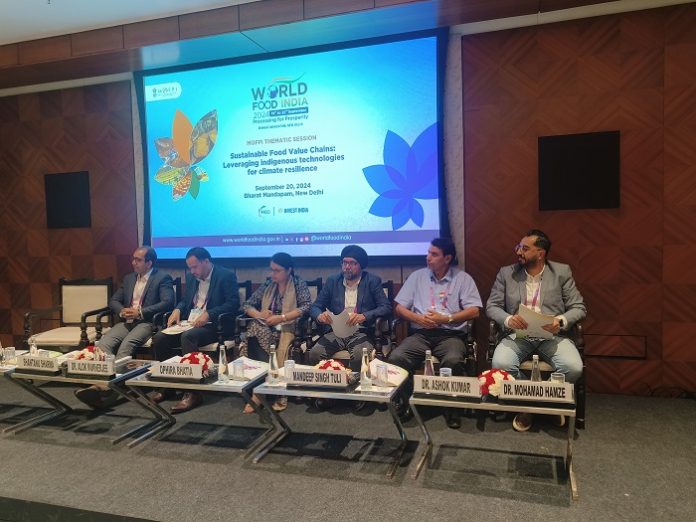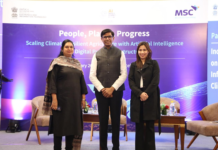
Sustainable food value chains and climate-resistant agriculture formed the crux of discussions at the recent World Food India conference in Delhi. In one session titled ‘Sustainable Food Value Chains: Leveraging indigenous technologies for climate resilience’, stakeholders from the industry and agro experts explained how there is a need to go back to traditional practices to battle the climate change effect on agriculture.
Dr Dipankar Saharia, senior director – administrative Services and Regional Centre, TERI, who was the moderator for the session, said indigenous knowledge should be introduced to have a truly sustainable food system. TERI, he says, has played an important role in documenting indigenous knowledge on terrace agriculture, and food preservation systems with indigenous communities such as solar drying systems and fermentation. It is that essential community members are assured of the benefits of sharing their knowledge, he said, adding we need to learn how to adapt indigenous farming techniques according to environmental conditions.
Dr Alok Mukherjee from Leads Nextech – SpaceTech and the R&D arm of BL Agro Group, said land is degrading as demand and productivity are increasing. Crop management practices can be a challenge as transformation can cause dilution if it is beyond a threshold, he said, taking the example of Punjab and Haryana which had a huge productivity years ago but now alarm bells are ringing in these regions.
There are 127 ecological zones in India, he said, adding that localized treatments are required in each of the ecological zones. Weather analytics are a central part of the journey of agriculture and crop management and planning, risk management and mitigation should be planned while keeping the weather analytics in mind. He said data-driven insurance to take care of farmers will play a huge role in the coming future and a shift is required in farming practices as well.
Shantanu Sharma, founder and chief marketing officer, Pro Zero Carbon, said India is one of the largest agrarian societies in the world with traditional practices that have been meaningful for hundreds of years. Many smaller manufacturing companies that rely on local farmer support need to address the gaps due to a lack of capital and understanding while monitoring everything from start to finish in the supply chain. Data is the most important element for developing climate resilience, he said, adding we need to track how much stubble farmers burnt, how much was used as farm manure, and how much was monetized by selling it off as pellets to a manufacturing facility. This data helps us to understand how to increase the yield of the crop and how much climate damage a farmer has done.
Ophira Bhatia, senior director, CGA India, AMEA CGA lead, Mondelez, said farm-to-fork sustainability, improving the efficiency of resources, focus on biodiversity, reducing carbon footprint, and food waste reduction should be key points in any food production initiative. The cocoa plant, which is not indigenous to India, was introduced in the country in 1959. Mondelez has a program called Cocoalife, under which it has developed sustainable farming practices with the Kerala Agricultural University such as intercropping with coconut and cocoa. The firm has collaborations and partnerships with farmers, farming institutes, agricultural institutions, and the government to provide subsidies to farmers for growing cocoa.
Mandeep Singh Tuli, procurement director, Nutrition & Ice Cream South Asia, HUL, spoke about resilient food value chains and the role of procurement strategies in adapting to food value chains. There is a need to develop strategies for responsible and sustainable sourcing of produce under extreme weather conditions, he said.
Focus on four areas – climate, nature, plastics and livelihood, he said, adding Scope 1, Scope 2 and Scope 3 emissions reduction, advance or key crops sourcing with areas free from deforestation and regenerative agriculture, less and better usage of plastics, and improving yields and livelihoods of farmers are what we need to focus on in each category.
Procurement strategies, according to him, need to work with reliable suppliers, geographical diversification of the supply base, regenerative agriculture and farming practices to improve yield, and the usage of technology such as QR codes to trace ingredients. He took the examples of QR code on Kissan Tomato Ketchup to trace tomatoes and the TeaPlus app, through which live info on weather and soil conditions, etc., can be accessed by more than 5,000 tea farmers. It is of prime importance to keep track of supply sources, he said. Resilience management takes into account data and technology to develop resilience in farm crops, he added.
Dr Mohamad Hamze, product owner, Blue Water Intelligence, France, stressed the need to use the right technology to solve the right problem. The company works to help farmers increase the efficiency of water use so as not to impact crop yield as well as handle the pressure of a changing climate. Climate change, scarce rainfall and increased irrigation is putting immense pressure on water resources, he said.
Temperature and precipitation are the two most important factors that affect crop yield, explained Ashok Kumar, agronomist, Food and Agriculture Organization (FAO), adding we need to monitor the temperature at the time of sowing, fertilization, and duration of the crop. Low precipitation can be addressed by the use of groundwater for irrigation and enlarging the area under cultivation. FAO is promoting rice varieties that use 30-40% less water than other traditional rice varieties. Drought-tolerant millet varieties have also been developed. The use of biofertilizers to improve microbes in the soil is also being advocated by the FAO. The government is coming up with schemes such as Mera Pani Meri Virasat in Haryana and Pradhan Mantri Krishi Vikas Yojana to help farmers.
The event was organized by the Ministry of food processing industries on 20 September 2024 at Bharat Mandapam in Pragati Maidan.
IndiFoodBev — authentic, impactful and influential
An English-language food and beverage processing and packaging industry B2B platform in print and web, IndiFoodBev is in its third year of publication. It is said that the Indian food and beverage industries represent approximately US$ 900 billion in revenues which implies more than 20% of the country’s GDP. Eliminating the wastage on the farmside can help to deliver more protein to a higher number of the population apart from generating sizable exports. The savings in soil, seeds, water, fertilizer, energy and ultimately food and nutrition could be the most immense contribution that country is poised to make to the moderation of climate change.
To improve your marketing and grow sales to the food and beverage processing and packaging industry, talk to us. Our research and consulting company IppStar [www.ippstar.org] can assess your potential and addressable markets in light of the competition. We can discuss marketing, communication, and sales strategies for market entry and growth.
Suppliers and service providers with a strategy and budget for targeted marketing can discuss using our hybrid print, web, video, and social media channels to create brand recognition linked to market relevance. Our technical writers are ready to meet you and your customers for content.
The second largest producer of fruit and vegetables in the world is continuously expanding processing capacities and delivery systems with appropriate innovative technologies. We cover product and consumer trends, nutrition, processing, research, equipment and packaging from farm to thali. Get our 2025 media kit and recalibrate your role in this dynamic market. Enhance your visibility and relevance to existing markets and turn potential customers into conversations. Ask for a sample copy of our bi-monthly in print or our weekly IndiFoodBev eZine each Wednesday.
For editorial info@ippgroup.in — for advertisement ads1@ippgroup.in and for subscriptions subscription@ippgroup.in
Naresh Khanna – 10 February 2025
Subscribe Now










